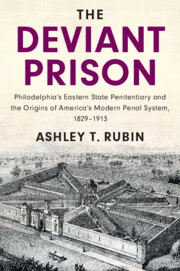 The Deviant Prison
The Deviant Prison Book contents
- Frontmatter
- Contents
- List of Figures
- List of Tables
- Acknowledgements
- List of Abbreviations
- A Brief Timeline
- Important Actors
- Introduction
- Part I Becoming the Deviant Prison: Establishing The Conditions for Personal Institutionalization
- 1 Faith and Failure: Experimenting with Solitary Confinement in America’s Early State Prisons
- 2 Born of Conflict: The Struggle to Authorize the Pennsylvania System
- B The Men in Charge
- 3 Uncertainty and Discretion: The Contours of Control at Eastern State Penitentiary
- 4 Criticism and Doubt: The Pennsylvania System and the Social Construction of Penal Norms
- Part II THE ADVANTAGE OF DIFFERENCE: The Process of Institutionalization
- Part III Forced to Adapt: The Conditions for and Process of Deinstitutionalization
- Appendix A Inspectors
- Index
4 - Criticism and Doubt: The Pennsylvania System and the Social Construction of Penal Norms
from Part I - Becoming the Deviant Prison: Establishing The Conditions for Personal Institutionalization
Published online by Cambridge University Press: 12 January 2021
- Frontmatter
- Contents
- List of Figures
- List of Tables
- Acknowledgements
- List of Abbreviations
- A Brief Timeline
- Important Actors
- Introduction
- Part I Becoming the Deviant Prison: Establishing The Conditions for Personal Institutionalization
- 1 Faith and Failure: Experimenting with Solitary Confinement in America’s Early State Prisons
- 2 Born of Conflict: The Struggle to Authorize the Pennsylvania System
- B The Men in Charge
- 3 Uncertainty and Discretion: The Contours of Control at Eastern State Penitentiary
- 4 Criticism and Doubt: The Pennsylvania System and the Social Construction of Penal Norms
- Part II THE ADVANTAGE OF DIFFERENCE: The Process of Institutionalization
- Part III Forced to Adapt: The Conditions for and Process of Deinstitutionalization
- Appendix A Inspectors
- Index
Summary
Eastern was far from exceptional in the level of prison administrators' autonomy and inexperience, but two factors distinguished the administration at Eastern from that at other prisons. First, Pennsylvania did not employ contractors to run their prisons; consequently, the men in charge at Eastern saw themselves as trusted caretakers of the prison rather than men motivated by the promise of profit. Second, as some commentators recognized, Eastern's administrators were particularly active. More than mere figureheads, they had greater control than at other prisons—and they took advantage of this greater control. It was, in effect, their prison, a feeling of ownership and responsibility that will become clear in the following chapters. This chapter introducesthe administrative and legal framework that provided a group of largely untrained and inexperienced men with tremendous control over Eastern and especially the difficult, and sometimes evasive, task of translating the Pennsylvania System into practice. It was this group of men for whom the Pennsylvania System became personally institutionalized and who would fight to maintain it at Eastern.
Keywords
- Type
- Chapter
- Information
- The Deviant PrisonPhiladelphia's Eastern State Penitentiary and the Origins of America's Modern Penal System, 1829–1913, pp. 99 - 130Publisher: Cambridge University PressPrint publication year: 2021


